#i love this show so dearly ugh the ART in that last scene
Explore tagged Tumblr posts
Text
STOLAS AND BLITZ'S CURRENT RELATIONSHIP IS A TREASURE TROVE
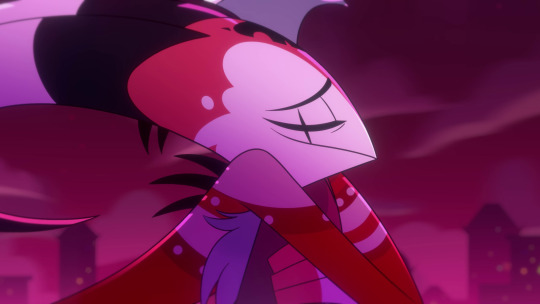
Helluva Boss is the ideal source material for fanworks in so many ways. Especially because of where Blitz and Stolas's relationship is right now.
One of the show's more obvious issues is the pacing, and while I don't know a ton about animated productions, it's always seemed to me like they're creating an enormously ambitious production on a pretty limited budget, so they kind of have to power through these episodes at a hundred miles an hour without the luxury of going at the slower, more nuanced pace they deserve. But that's where fanfiction and fanart can really elevate what canon gives us, because the show is creating so much potential to explore, and we have time in between episodes to play!
Basically: I love it here and this episode was a buffet of goodness.
Following Mastermind, Stolas and Blitz are discovering that despite their physically intimate relationship and their feelings for each other, they don't actually know each other.
In Sinsmas, we see Stolas and Blitz discovering so many new things about each other, to the point where you wonder what they ever talked about until you remember: sex. When they reunited as adults, they never re-learned who each other is now. Instead, they jumped past personal intimacy to physical intimacy.
And now that they're working on their personal intimacy, I love that Blitz has flipped completely from acting cold to Stolas out of uncertainty and self-defense to committing to him, unrelentingly loyal and affectionate. The way he is with Loona.
So we have them learning each other in doses:
• Blitz's horse thing
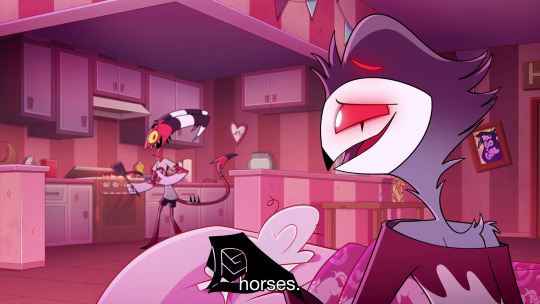
• Stolas's secret medication
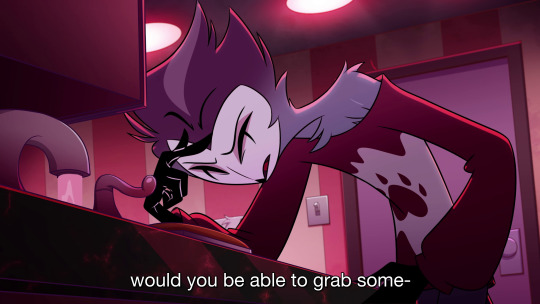
• What Stolas eats
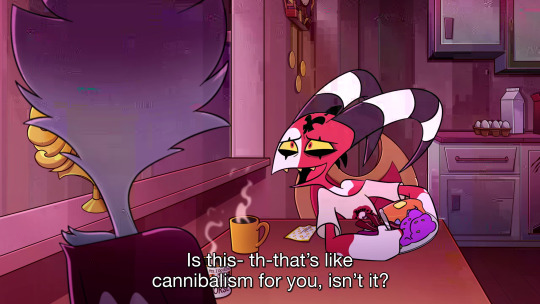
• Social norms Stolas didn't have to know when he was part of the wealthy ruling class
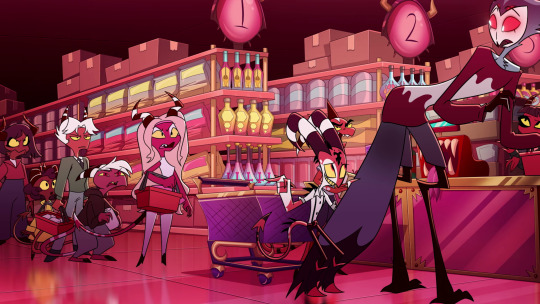
• Hellborn culture
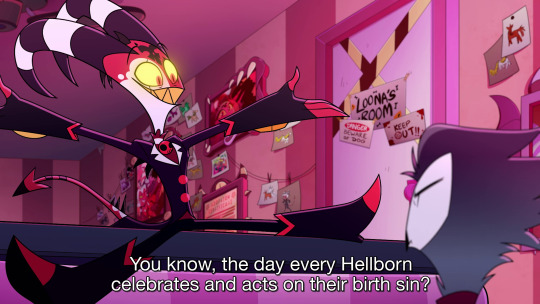
• Blitz's genuine love for the company he built, not just pride
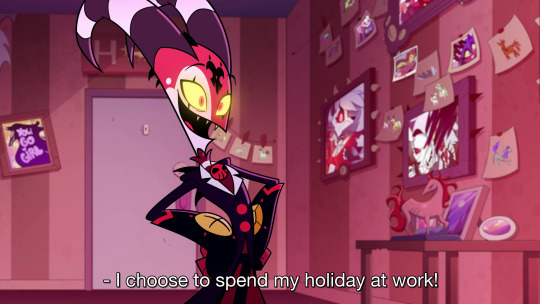
• Just how different Blitz's way of life is from the one Stolas is accustomed to
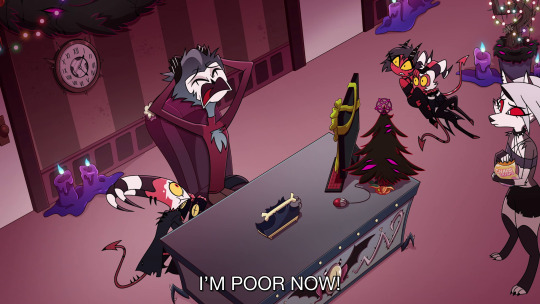
• And the real Blitz as opposed to the idealized version Stolas invented in his fantasies
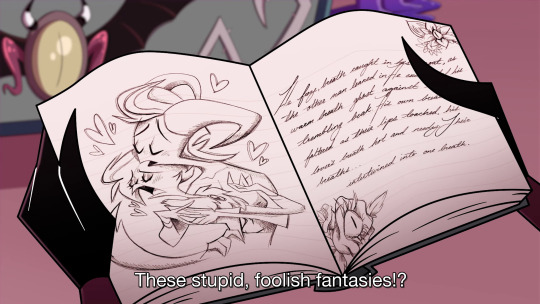
In Mastermind, Stolas has that line, "Why am I throwing my freedom away for this idiot?" in part because he was still mad at Blitz, but also because Blitz has been knocked off his pedestal, and Stolas has to relearn him from nothing.
But the thing is: this idiot loves Stolas.
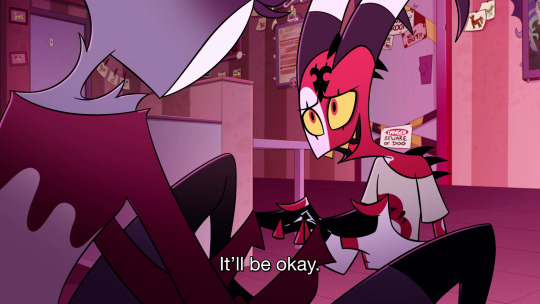
He's not ashamed to eat with Stolas in public, not ashamed to protect him from the other Hellborn who hate Stolas because of the trial.
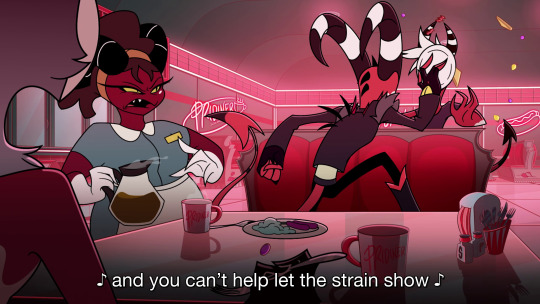
He's genuinely delighted spending his time with Stolas.
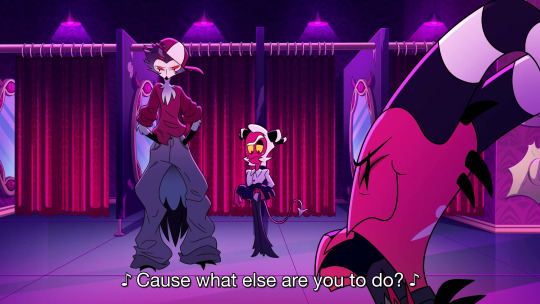
He'll hunt rats in an alley just to make sure Stolas is eating what he likes.
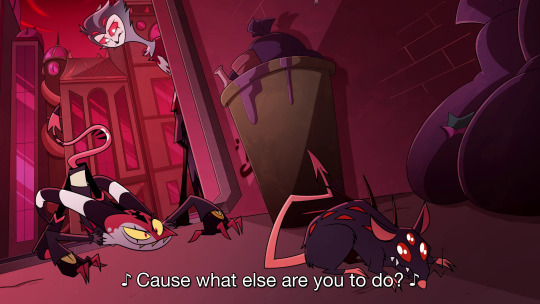
And he champions Stolas's very first secretarial attempt in very characteristically giddy flavor.
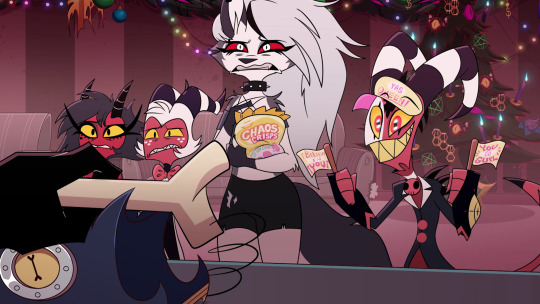
He risks his life to save Stolas's, a flip from Mastermind.
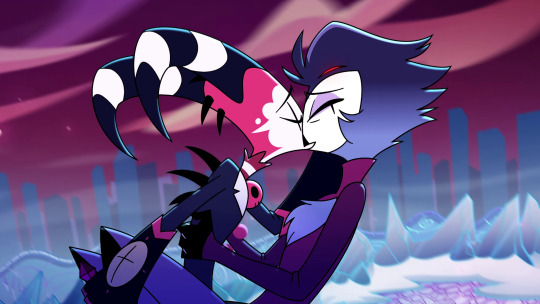
He wraps Stolas in his own jacket to keep him warm, even though Blitz just complained about Earth's winter topside.
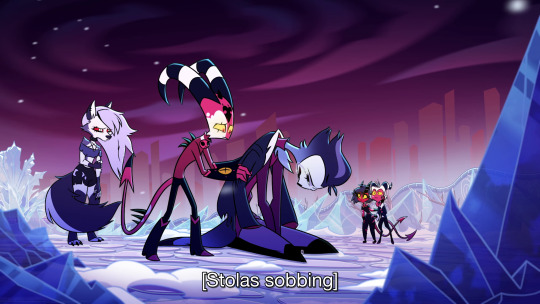
And he wraps Stolas in a blanket, then eats hot coals/brimstone(/whatever those rocks were) to become a hot water bottle for Stolas.
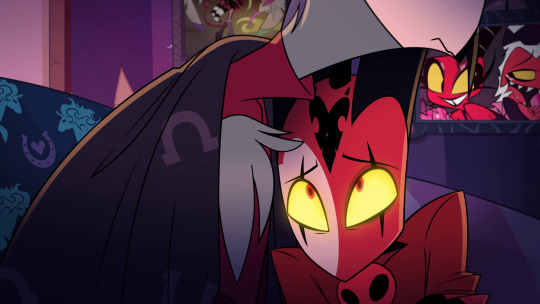
Because ultimately, what Blitz wants and perhaps realizes he wants in this episode is that he wants to be a complete family with Stolas and their daughters.
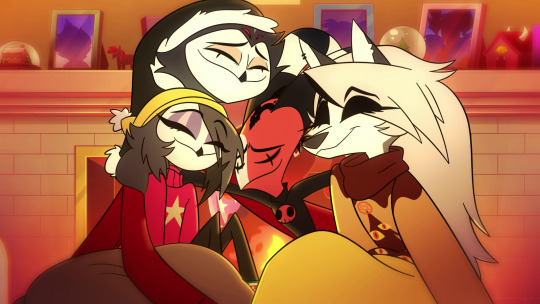
And they'll get there in part by talking to each other about what matters.
Not fighting, not yelling, not walking away, just talking to each other. About their vulnerabilities and their fears and what hurts. About their past hurts and their worries for the future.
And they've never done that at length before.
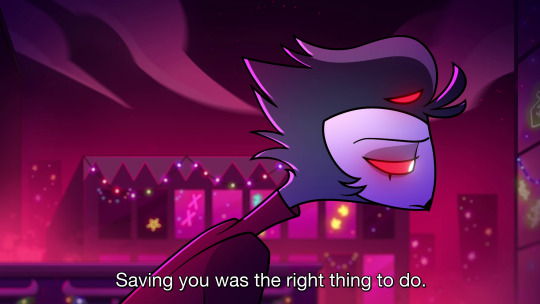
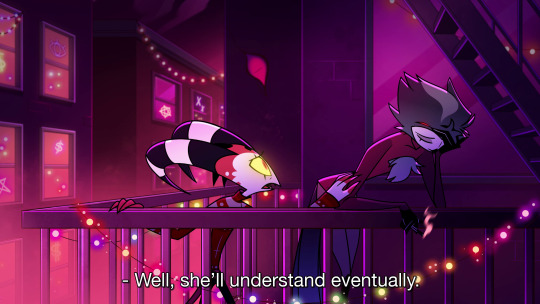
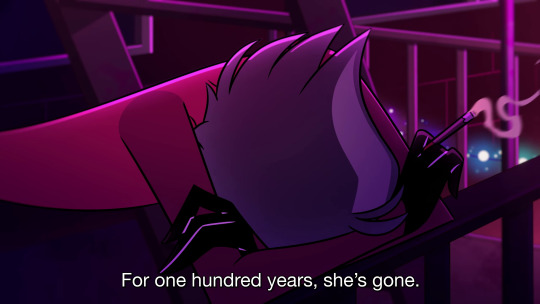
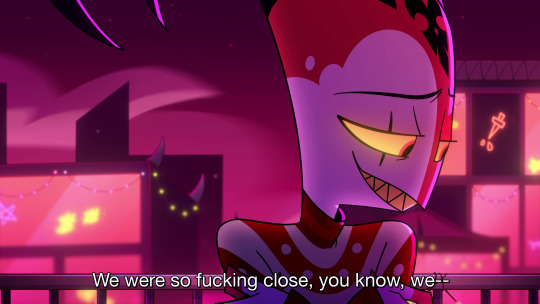
The trial gave Blitz the wakeup call he needed, and now the season is ending with Blitz completing another curve of his character arc. Does he believe he deserves Stolas? No. Does he have the family he wants? Nope! But to get there he has to make things right with Stolas, and he's (mostly) done that.

What comes next for them in season three will be up to Stolas.
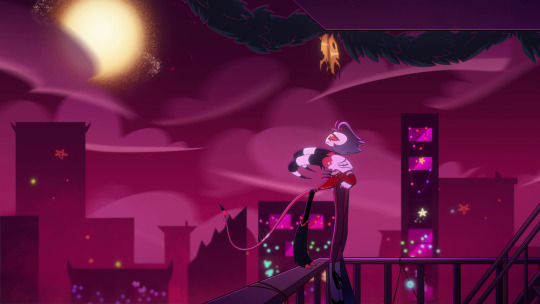
Blitz has embraced Stolas, but it's not quite reciprocal yet.
So I look forward to aaaaaaalllllllllI the fic and fanart along the way. :>
#helluva boss spoilers#helluva boss sinsmas#helluva boss#stolas x blitz#stolitz#i love this show so dearly ugh the ART in that last scene
53 notes
·
View notes
Text
BRIDE OF THE WATER GOD
I just want to unload all the feelings relating to Bride of the Water God. Hahahha
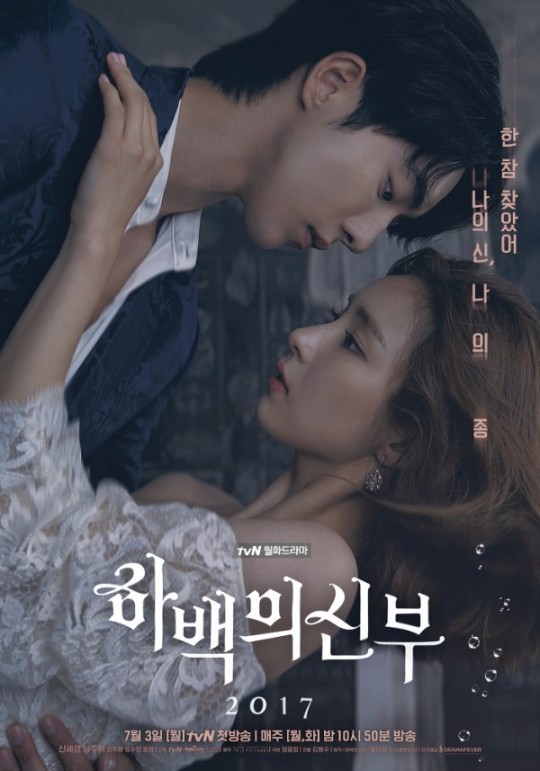
I was an avid reader of the Bride of the Water God Manhwa during my college years. I couldn’t find other words to describe the art but perfection. However, it wasn’t popular on the internet unlike the Japanese ones but I remembered correctly it was on the top lists of the manhwas to read.
This will be of course in the perspective of someone who read Bride of the Water God Manhwa.
I have to say it has the best fantasy/romance plot of all the mangas AND manhwas in the same genre that I have ever read in my life. I could say it’s unlike any other. If I could worship Yoon Mi-Kyung for her creation, I would. hahahaha
When the news broke out that there would be a live action of Bride of the Water God, I am already a bit skeptical especially when they mentioned, “filmed in the modern setting”. I was ranting in Twitter but spared further judgement of the kdrama.. Y’know, there’s still a “maybe they could pull it off”.
I am following the live action closely and as of writing this, I just finished ep 12.
As a fan of the Manhwa, I AM DEEPLY DISAPPOINTED not with Nam Joo Hyuk or Shin Se Kyung’s acting, or the choice of actors and actresses but with the team behind the live action. They have stripped it with essential parts – the politics in the realm of gods and the importance of side characters – which made Bride of the Water God special. They have reduced to just the romance between of two characters, So-ah and Habaek and have made it the basically the same with other kdramas out there.
I was looking forward to Nakbin-Habaek because in the original story, Nakbin was his original bride. He loved her dearly and even promised that he would marry her again if she reincarnated. Heck, he can’t even let her go even with So-Ah around. She was a major chess piece in this whole fiasco. In the live action, she’s just the ex and a disgrace. She’s THE Ex, dammit! There’s Nakbin’s curse and why she did it. The prophecy or some sh*t that Nakbin is his bride but another one will be his soulmate (hi, So-Ah). Nakbin’s decision to let Habaek go. The quest to acquire eternal life/longevity for So-Ah. Su Wang-Mo and Dong Wang-Kong (this! omg.. the love story between them is just ugh). The brothers’ quarrel. Especially the last since it started the shit show in the whole realm in the first place.
To me, the live action just borrowed the characters’ name and the title itself to create buzz for the show. That’s it. A marketing ploy. They probably hoped that the manhwa fans would appreciate and learn to love it by putting some romantic scenes which failed, obviously seen in ratings, manhwa fans are having none of that. Ok, imma take some of it bec NJH
I was also excited to see Nam Joo Hyuk’s ‘cosplay’ of Habaek… If I could just burn his wig with his costume designer it would appease my upset fan girl heart.
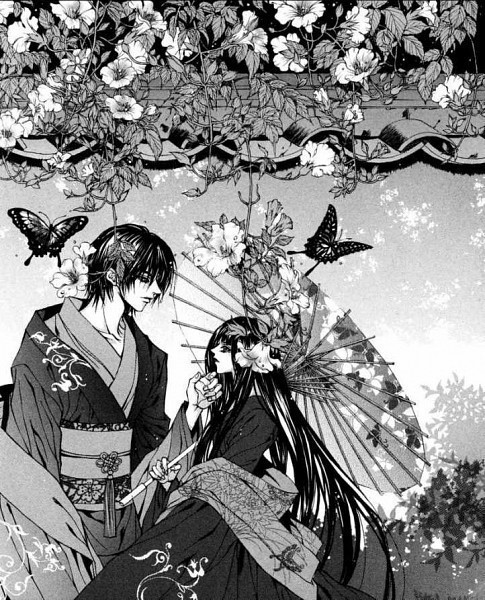
Photo credit: Yoon Mi-Kyung
The only thing that keeps me on watching Bride of the Water God is that Nam Joo Hyuk is Habaek. Such eye candy, yes? He’s acting is okay so don’t blame the poor guy.
It would’ve been better if they didn’t use the damn title.

6 notes
·
View notes
Text
Episode 5: Poliana Irizarry
[0:07]
Maira: Alright, this is, I think this is 5? Episode 5 of Long Arm Stapler, a podcast about zines. Today we are [clears throat] joined by-
Poliana: Hello, I’m Poliana Irizarry.
Maira: Welcome to my couch.
Poliana: Yes, it’s a lovely couch.
Maira: This is my recording studio. So, do you want to tell everyone a little about your experience with zines? And like because you’ve got a lot.
Poliana: Yeah! So, um, I’m really old, and I’ve been doing zine stuff for a really long time. So back in the riot grrl 90’s I guess, I got into zines as a high school slash college student. I lived within walking distance of the Inwood Theater in Dallas, Texas. The long-standing zine musea was freely available in the lobby because Tom Hendricks, I think his name was Art S. Revolutionary, um, uh, worked there. And would just give away zines for free. Um, I was like, “This is the coolest,” and then I realized that um, the stuff I had seen in like, at shows, those were also zines. I didn’t really make the connection um, about like what zines were until kind of encountering them a couple of times. And I tried to make my own zine, this was back in like 1997, ’98, about the Dallas, Texas late 90’s punk scene. I was very influenced by um, Buzzmonger Fanzine, which is still one of my favorite zines ever, especially about music and interviews and bands and touring and a local scene. Um, and then I realized the zine I wanted to make was Buzzmonger and I kind of got frustrated like, with technical difficulties, like my computer crashing and uh trying to transcribe interviews and stuff that I did. I was like, nineteen, maybe twenty, so fast forward, forward to like, I finally, ten years, I finally finish um, college. And then grad school, and I make my first zine, I’m living in Philadelphia, and there was the Philly Zine Fest at the Rotunda, I want to say this was 2008? 2007? That zine fest has been going on for over a decade, so it was maybe the third or so year. I went and I brought my zines to trade, no wait, the first year I went, I just went and was like, “I have fifty dollars,” and I spent them all very quickly. But I came home with this huge tote bag full of zines, um, well a regular sized tote bag, but it was pretty full. Um, and then the next year, one of the organizers I met at Wooden Shoe Books, Sawyer, was trying to convince me to table. And I was like, “Ummmmmm, no.” So instead, I just walked around trading zines. And I made, I think I want to say like, thirty copies? And everyone I asked to trade, almost everyone traded me. It was amazing, I came home with more zines than the year before, and I didn’t spend any money, because I just thought that was the coolest thing. Um, I’m really into, um, not spending money. Like, defeating capitalism by being a broke-ass. So um, like I was hooked. And that’s kind of been my motivator ever since, um, I tabled the year after and I sat next to Ray Quall Solomon, Sistress the Child Empress, ugh, Lou Gritand, made friends, and we talked zines, and we talked shit on Philly, and um it was great. So, I’ve been, I guess it’s been about ten years since that experience now, um, eleven years, something like that.
Maira: And now you’re doing really big things in the San Jose DIY community.
Poliana: Yeah! I moved to San Jose from Philadelphia about 4 years ago, and I was like, “Okay, where- okay, I’m here now, I want to find out where the punk shows are at, and where the zine people are at.” And-
Maira: You found both.
Poliana: I found both in this wonderful community DIY collective called Think and Die Thinking, um, they were a long-standing group of San Jose locals um, and their friends, and um, comrades, um who organized amazing DIY shows, the Think and Die Thinking Festival, um which-
Maira: Which is where I first encountered zines.
Poliana: Yes, yes!
Maira: In the wild.
Poliana: So many people say that Think and Die Thinking was their first time to see zines and I just think that’s wonderful, because um, first of all, Think and Die Thinking Festival um, was um put together to uplift and highlight and feature the voices of people of color, color especially queer people of color, and the LGBTQ community, so those intersecting identities of people of color and LGBTQ people. Um, especially youth, it was very important for it to be all-ages, for it to be a safe space, um, and feminist, and to be trans-inclusive, and to um, uplift voices of color. Which, all of those things are incredible, and was rare enough to see just 1 aspect of identity focused on in any kind of group, but for this collective to um, just fucking demand all of that, is important. All of these things that we are a part of are important, and we are going to focus on that. So the bands that were there, um, were all part of this mindset. And the zines, there was a zine swap, there was a Summer of Discontent Zine Swap, and like a writing process, where we all met up if you wanted to be part of that. Um, everyone met up a couple of times over the summer, and at the end of the summer we had a swap at um, SV Debug, Silicon Valley Debug. Um, and then um, the 2015 Think and Die Thinking, which ended up being the last festival, but um, I volunteered to help out, and I am so, so grateful, so fortunate that Bean and everybody else from TADT Collective let me help out with the zine stuff. Um, we organized the zine library on the second floor of the Billy DeFrank Center, which is the LGBTQ center in San Jose, and um, we also organized different zine readings. And um, it was a really great idea, um, from years before, that there was always an open mic on the stage so that people could do slam poetry, zine readings, poetry readings, or just speak their mind um, in between acts. And uh, while the bands were setting up. And it was only used a couple of times I think outside of the readings, but I think the year before, it was definitely more part of the festival. So in order to encourage that, we scheduled the zine readings in between the bands, which um, I think also opened up a lot of peoples’ minds um, and eyes and ears, to zines um in the DIY punk community. And then also people who were zinesters, you couldn’t just like, hide upstairs all day if you wanted to see a zine reading, or go look at the zines that were for sale or for trade, in the main festival area. Uh, you needed to watch the bands, too. So I just thought it was a really great idea, it was kind of like taking the riot grrl um, which was very [exhales] exclusive and clique-ish, taking that aspect of zines and flipping it on its head and making it inclusive and accessible, and I just- I love it. It’s um, working with zinesters in San Jose and the entire Bay Area, but San Jose and the South Bay specifically, has just enriched my life.
Maira: And that’s where we actually met, was that Think and Die Thinking, and that’s when I did my first reading, and I couldn’t finish it, and I like, cried and ran off- I wasn’t onstage, I was just like in front of the stage and I just like started crying and ran away.
Poliana: First of all, I don’t remember that was your first reading.
Maira: Yeah.
Poliana: And I um, I wish there was a camera here you could see my face. That was Maira’s, their first reading!? Second of all, I don’t remember you crying and running away, no not at all. I remember that you spoke very passionately and then it seemed to me like you had finished and exited stage quickly, not as in you know, couldn’t finish. You stopped naturally.
Maira: Okay. I mean I finished what I wanted to read. I was reading a piece from probably my heaviest zine, it was about like, sexual assault and trauma. And being trans. Yeah, and that was, I was really set on reading that piece, and I got really in- really inspired by all the other readers, so I was like, “Yeah, I can do this!” And then I did it.
Poliana: You did it!
Maira: And I’ve cried at most readings since then?
Poliana: Yeah, yeah.
Maira: But, I feel like it’s hard to like, really talk about personal stuff and kind of not- because when you’re doing a reading, it’s not really a dialogue, it’s more, “Here are my feelings, let me throw them at you.”
Poliana: Mhm.
Maira: And then you kind of just like, wait. So, it’s hard to be vulnerable in that kind of space without crying, at least for me.
Poliana: Um, I think that everybody who read over that festival, 3 day festival, are some of the most brave, courageous, incredible, powerful people I have ever encountered. I’m an Aquarius, I’m a quadruple Aquarius, so I- I know a lot of people but I don’t have a lot of friends, and the people that I met from that fest, I still keep in touch with, and so hold dearly. And it’s because we got so vulnerable, I cried so often, so much. And there was kind of a joke amongst the organizers, um, that, “You’re not really at Think and Die Thinking unless you’re crying,” and, “How many times have you cried today?” You know. And um because that space was intended to be therapeutic-
Maira: Sad? [laughs]
Poliana: Therapeutic! [laughs] Um, vulnerable, um, emotional, um it was an intentional safe space. Uh, how successful that is for each individual, um depends on the individual. Your mileage may vary. But, the intentionality was that it was created so that we could have this space to process, um with our family, with our community. Um, and I think for me it was very successful in that because yeah I definitely cried. Um, I read as well, I was very hesitant to read, and I waited because as an organizer, I kind of felt like- Okay, also first of all, I’m not from San Jose. San Jose is under rapid gentrification; the entire Bay Area is. Um, there are a lot of people coming into these cities, such as myself, who are not from there and taking leadership roles. I think that the best usage of my talents and time and um, skills and experience is to utilize those to uplift local voices. Period. So, that being said, when somebody was unable to read, when we had someone bow out, I was encouraged to read, and so I did, that’s how I play it. So, I read, I cried afterwards and um, I had several people walk up to me and thank me, and I was like, “The fuck?”
[Maira laughs]
Poliana: Because I don’t, I don’t know, I always think of my zines as kind of like, um, “I wrote this thing so, I created this document, this thing, so that I could trick you into trading me yours.” That’s just like, my mental illness manifesting as like, self-loathing. And I know it’s not true, I mean-
Maira: It’s not.
Poliana: I write a lot, I re-read it, I edit it, I work really hard. They’re not bad, um, I’m proud of most of them. But I don’t, I haven’t, I’ve only read until I got to California. I read one time; the responses are amazing. Yeah, that whole thing of being vulnerable and then sharing your work and then waiting-
Maira: Yeah.
Poliana: It’s not a conversation, it’s um, I hesitate to say performance, but it’s kind of how it feels? Like, you have to practice it in order for it to feel right. Um, and then the people who like, “Woah, they’re really good,” kind of have that actor thing going, where they’re like-
Maira: They’re in the zone.
Poliana: Yeah! They’re like, reciting poetry or whatever they’re writing, but uh, it’s like storytelling, the narrative um, is uh, engaging. Um, not like lots of “um,” people practice and say important things. So, uh, yeah! I want to be like that, sure, but then I kind of also don’t want to. [laughs]
Maira: I don’t… A lot of times, if I read, it will be something that I wrote and haven’t gone back to since I like, sent out the zine. And so sometimes, it’s kind of a surprise to me? And I’m just like, “Oh wait yeah, I wrote that. Oh, time to cry.” Um-
Poliana: Yeah.
Maira: But yeah like you were saying, it’s weird… it feels weird to me when people come up and thank me. It’s cool because it’s like, I’m being really vulnerable and I’m letting them in, sometimes they’re going through similar shit. And so, I guess they’re thanking me for like, I don’t know, having someone to relate to? But it also is always overwhelming and I’m like, “Thanks for what? I didn’t do anything, I just… cried.” But I do understand the emotional labor that comes with that, and reading, and I feel like when I read, I’m giving a lot. And a lot of people when they read, are giving a lot of themselves to the audience and the listeners, and that’s, that feels really powerful. I always feel really good after I read.
Poliana: Yeah.
Maira: But it doesn’t necessarily feel good while I’m doing it if that makes sense.
Poliana: Yeah, yeah. No, it’s not really an enjoyable activity to be on a stage or in front of a microphone, um, reading my work usually. Um, I think for me, um, I oscillate between just kind of neurotic observances, neurotic observations about the minutia in my life, or really heavy, deep, introspective um, like, literally I’m in crisis and writing about it. So, I wonder if maybe I wrote like, powerful, uplifting stuff, maybe I could be one of those motivational speakers. Like in my dreams, I am cooler than DJ Khaled, and I am telling everybody… I’m just like a cheerleader. I’m like a zine cheerleader, but um-
Maira: In real life or in your dreams? Because you’re like that in real life.
Poliana: Okay well, I want to be that but in like a, I don’t know, I guess the kids are calling it a “brand.”
Maira: Okay.
Poliana: Yeah I want that to like, to be my thing. And I do- so, so I do that, kind of, like I’m on my way to being that because um, this is all, it’s all coming together. The way that I look at zine events, and zine readings especially, is that I want to, once again, leverage my experience and my own emotional [giggles] vulnerability, I was going to say illness, but etcetera. I want to create a space, to work on creating a space so my community can also do the same. And, and find that freedom. Um, find that uh, that emotional release, and just fucking get free. So, like there’s the trade-off, the trade-off is I have to do it, too. [laughs] But um, [stuttering] I enjoy the aftereffects as well, yeah. The talking and the, well I really like compliments.
Maira: Yeah.
Poliana: Compliments are nice, especially a compliment on my writing. Um, that’s the best! Like I don’t necessarily um, love my writing, but I want to. [laughs] I want to love my writing so much that I got a degree in writing. But um-
Maira: Same.
Poliana: [laughs] Right? Yeah.
Maira: I know I can write; I don’t know how-
Poliana: You’re a fantastic writer.
Maira: Look who’s talking.
Poliana: Exactly, thank you.
Maira: But yeah, thank you. I don’t mean to, I feel like whenever somebody compliments me I’m like, “Right back at you!” Like immediately, but it’s not- I do take it in. Thank you. You are also a wonderful writer.
Poliana: Thank you.
Maira: Um, yeah sorry, I totally interrupted you.
Poliana: No! I was winding down I think. [laughs] I don’t know. Okay, this is my first ever podcast-
Maira: [laughs] So after Think and Die Thinking, you got, so you’re like a big-time zine fest organizer now.
Poliana: I am now a, uh, small-time. [laughs] No, you know what? So, what happened was, um, Think and Die Thinking, their collective wrapped up, ceased to exist, they uh, came to a conclusion. The reason being that several of them moved away, there was also some, there’s always interpersonal drama, etcetera. But the zinesters are still there, and many of the people are still there, and um, we wanted a zine fest.
[Maira says something indecipherable]
Poliana: Luckily, in San Jose. In San Jose, luckily, the brilliant genius Ivy Atoms was part of this um, art collective in Downtown San Jose. They um, converted an old department store, an old Ross, into an impromptu art gallery. Uh, we thought it was a community-run space, that turned out to not necessarily be the truthiest truth. In any case, Ivy had access to this huge space, and the desire to have a fest, she called it San Jose Zine Con, because San Jose, this is in fact Fanime weekend. San Jose has lots of conventions of uh, like-minded artists and writers and fans of different fandoms.
Maira: You can say weebs, it’s fine.
Poliana: And weebs. Lots of weebs. I actually learned um, the term weeb from Fanime. Listen, I live my life a quarter mile at a time, I don’t have friends, I have Fanime. Thank you, I’m so glad I got to use that joke. Thank you.
[both laugh]
Poliana: So yeah! Um, so she put out the call, “Uh, hey, who’s going to help me organize this?” And I’m like, “Hey, I can help!” And so we got a whole bunch of people together, Li Patron of Cheers From the Wasteland, and Erick Saenz, who also edits that journal- zine, online zine. And also, regular zine, paper zine. “Dear Hometown,” everyone pick it up, it’s amazing. And Saoirse Allessandro also helped. And Bee. Oh, I’m starting to name people and I’m going to forget everyone and embarrass myself. Crystal Olivas, and Diana Hernandez, and a bunch of us, a bunch of us. There were more, I forgot, I’m sorry. Eli! Eli Wenig, a lot of us helped out and did the first San Jose Zine Con on a shoestring budget, um-
Maira: That was 2017?
Poliana: That was February 2017, it ended up being over a hundred people, a hundred tablers, we had people from all over California come up. We started off huge, because we had access to this huge space, and then it was like, well, we have this huge space that was free, all we have to do is pay for tables and chairs. Well really, if you bring your own table and chair, then it can be free. So, we made it sliding scale, donation-based and ended up raising money because we made a profit that we donated to Trans Legal Center, the Billy DeFrank Center, a couple other places. Um, and it was tight because it was sliding scale, and free for many people. Some zine fests in the Bay Area, actually in California as a whole, I know that some zine fests cost $45 for a half table, some are sliding scale, um donation-based. You know, I just want everything to be free for everyone because money sucks and is difficult. And why just make everything easy and don’t have any money. Um, that’s a dream, but you can make the dream happen if uh, you get lucky and have a lot of people with weird ideas, like that’s my segue into 2018 San Jose Zine Con, which was um, a month ago. And it was free because we had it at the library! Ricardo Padilla from Latino Comics Expo had the 2014 Latino Comics Expo at San Jose Public Library, at King Library, and I just thought that was the coolest event. It was super chill. Okay so, in my day job, I’m a librarian, so I’m predisposed to like libraries and library people, but it was, it was, their library there, King Library, is so big because it’s also part of San Jose State University’s library. So, they had this huge meeting room area, and that’s where they had that event. So, I messaged him and said, “Hey, you know, can you tell me, can you give me a hint on how much your budget was for this? And um, how can we replicate this? Because we want to do this again and um, we didn’t have a venue anymore.” And it turns out it’s um, free for community events. So, that’s buried in the twenty seventh minute of this podcast, is that San Jose Public Library, if you reserve the rooms um, early enough in the year, you can get a Saturday or a Sunday, whatever you want, tables and chairs are free, included. You’ve just got to make sure that you don’t charge for anything. And we didn’t want to charge for anything! So, it’s free. We’re a community event, non-profit organization, open to all, open access to all, and so I encourage somebody else in Zinester Land, or um maybe in Comic Book Land, um, perhaps people that like anything, any kind of alternative press, or small press, to also look into working with the King Library folks. Um, to make your event free and accessible to all.
Maira: And also, if you’re not in the Bay Area, look into your local library.
Poliana: Yeah!
Maira: They will probably do the same thing.
Poliana: Yes, actually, I got this idea from Anaheim Zine Fest, wait no, I’m sorry, it’s called Orange County Zine Fest. And it’s held at the Anaheim Public Library. And same thing, it actually ends up, the library ends up benefitting, for that zine fest the library ends up printing tote bags and t-shirts and stickers and buttons to sell as a fundraiser. And then the zine fest brings in people from the community who wouldn’t normally go to the library, who don’t necessarily know that the library has anything for them. And also the benefit on the zine side, it’s free, it’s accessible, it’s a safe space, it’s a community public space, so it’s you know, all ages, um, welcoming, all that good stuff. Um, yeah! So definitely contact your local library.
Maira: The year I went to OC Zine Fest it was in a parking garage, which was really cool.
Poliana: Ooh, interesting.
Maira: Yeah, that was a rough weekend, because I went down to Tijuana Zine Fest that same weekend.
Poliana: Woah.
Maira: Yeah. It was wild, and I got a foot and a half tall Chewbacca piggy bank out of it, um, which was truly one of my finest purchases to date.
Poliana: [gasps] I love two and a half tall ceramic Chewbacca.
Maira: Yeah.
Poliana: He sounds nice.
Maira: He sat in my car for a really long time, and then he broke, but you know…
Poliana: It happens.
Maira: Yeah!
Poliana: But you had him for a long time.
Maira: Yeah, but OC Zine Fest was really cool, Tijuana Zine Fest was really cool.
Poliana: That’s on my list, I haven’t been to Tijuana yet. Long Beach Zine Fest is incredible.
Maira: Long Beach, I think I’ve told all of the organizers this, but that’s one of my favorite fests.
Poliana: It’s incredible! You can go there, okay, so it’s in a museum. Okay, so first of all, Santa Cruz Zine Fest is also in a museum, Santa Cruz Museum of Art is small, Long Beach Museum of Art is huge!
Maira: And it’s the Museum of Latin American Art, too.
Poliana: Yes, yes. Exactly, so it’s Latin American history and art, so it is educational and beautiful for the whole family.
Maira: And it’s on Free Day.
Poliana: Yes! Exactly, they make it a community event, the um, Long Beach Zine Fest organizers bring in friends’ bands to play, and serve food and drinks, and they have like a water stand so you can refill your bottle. Um-
Maira: Long Beach Zine Fest fucking rules.
Poliana: It’s tight. Yeah, it’s tight.
Maira: Shout out to uh-
Poliana: Shout out.
Maira: Daniel and Ziba.
Poliana: Ziba is-
Maira: Ziba is amazing.
Poliana: The best. Now, you want to talk about librarians, Ziba rules. Everyone just follow Ziba, Zebra Pizza Zine, and Ziba is a librarian now at um, Los Angeles Public Library. But she was a librarian at Long Beach and started their zine library, now she’s started one in L.A., I think she started one also in Ocean Beach, perhaps? I could be wrong, but I do know that she is um, goals. She’s librarian and zinesters goals for me. I uh, I do declare.
Maira: I actually went to her library when I, I took my sister down to L.A.-
Poliana: Oh, you went to Baldwin Hills! Yes!
Maira: Yeah, and so we went to the Baldwin Hills library and I took my sister to get a library card because she’s trying to get one from like, every library she can so she can get free e-books.
Poliana: Yes.
Maira: But we like, posed… we hard-styled in front of the zine library, naturally. Um-
Poliana: It’s beautiful.
Maira: As I do-
Poliana: Mhm.
Maira: And as I make people do with me.
Poliana: Yes.
Maira: [laughs] So, it was, it was really cool to see it in person, and I had never seen zines in a library in person before. Until like, earlier this year, or last year, whenever I went.
Poliana: Mhm, mhm, it’s so cool. I love a good zine library. If we’re going to transition to talking about zine libraries…
Maira: Yeah! I, well-
Poliana: I’d like to plug-
Maira: Do you want to talk about organizing one, or talk about whatever.
Poliana: Oh, yeah. Well, okay, I was just trying to segue into South Bay DIY Zine Collective-
Maira: Hell yeah.
Poliana: A zine library that a few zinesters started, actually rising from the ashes of the Think and Die Thinking zine library. Um, Sherise Gutierrez approached me about taking the zines from TADT, and continuing on the portable zine library that they created, and then I was talking about it excitedly with Diana Hernandez, um, who at the time was working at the LGBTQ Youth Space in San Jose, and um, so she was like, “Well, why don’t you keep the zine library at the space? And then when you want to take it out somewhere, you just come to the space and take it with you.” And so, and so there it was. The collective was born, and the zine library was born, and um, it’s completely donation-based. We got our first round of donations from the first San Jose Zine Con, um, just about everybody who tabled donated a zine to the library. And so, me being a librarian, I have goals for the library, it’s not just like, zines are cool. I wanted to make, I mean, they are, so, but my intention with the South Bay DIY Zine Collective library is that the zines reflect the community who uh uses it. So, I intentionally solicit donations from communities of color, zinesters of color, and LGBTQ-identified zinesters, because that’s like, the best zines. But also, um- [laughs]
Maira: Very true.
Poliana: That’s very true. But also, that’s who uses the Space. So um, it’s gorgeous. It’s such a great library.
Maira: Are you still doing workshops there?
Poliana: Yes, yes! So, every month, mostly every month, um uh, we have workshops, zine making workshops. Maira, part of Queer Anxiety Babiez Zines Distro, Maira and Kristen brought in stamp making and um, collage um, making. So, we basically get zinesters from the community to teach workshops. Once again, I don’t like to do a lot of the teaching myself because I’m not trying to gentrify zines in San Jose. Um, but I want to, um, give zinesters a chance to teach each other. And to encourage that community and that culture to happen, and it’s been really fun. I think the best-attended, the most popular workshops have been poetry-based. Elliott Sky Case did an amazing workshop, Ashley Andrade also did another one. Spoiler alert: both of them have agreed to do workshops again this year, so that’s coming soon.
Maira: Whoo!
Poliana: Um, uh and, one of my goals is to start a Patreon for the zine library, so I can start paying zinesters to come do workshops, like a stipend. I would like to do that because, you know, zinester labor is important and valuable and should be paid. Um, the only time money is good is when you’re giving it to people who need it. So! Um, um, that’s how I feel about that. What about organizing did you want; did you want to-
Maira: I selfishly wanted to segue into Queer Zine Fest.
Poliana: Yes!
Maira: Bay Area Queer Zine Fest-
Poliana: Yes!
Maira: Is back. I think I’ve talked about it every episode so far, but for those of you who don’t know, we both organize Bay Area Queer Zine Fest, it’s happening, this is the second annual one coming up on Sunday, September 9th, at Humanist Hall in Oakland. Yeah, so we’re both organizing it again this year, and I wanted to talk about how San Jose Zine Con was kind of one of the things that I pulled from when I was inspired to start Bay Area Queer Zine Fest.
Poliana: Wow.
Maira: It was, it was definitely inspiration from Ara Jo and EBABZ, EBABZ is like my ultimate zine fest, and now I’m in my third year organizing with them and it feels amazing every time we meet.
Poliana: East Bay Alternative Book and Zine… Fair?
Maira: Fest.
Poliana: Fest. EBABZ.
Maira: But yeah, it was inspiration from Ara, and EBABZ, and San Jose Zine Con.
Poliana: Thank you, that’s really awesome. I have to say all the credit should go to Ivy Atoms.
Maira: Who also organized last year!
Poliana: Yes.
Maira: She did our wonderful flier.
Poliana: Yes! Oh my gosh, yes.
Maira: So, yeah. Let’s talk about Queer Zine Fest this year.
Poliana: Yes.
Maira: If you want to.
Poliana: I would love to. So, there’s a lot of really good organizers, I am one of many helpers, um, but I, as soon as you approached me last year, or put the call out – I don’t know. Um-
Maira: I can’t remember.
Poliana: Yeah, I don’t remember. It’s probably on the internet, that’s okay though. I forgive it.
[both laugh]
Maira: Most things I do are on the internet.
Poliana: Same, same. That’s where I’m a Viking. So, once you approach- once I heard about it, I was enthusiastically in, except that I live in San Jose, which is fifty nine miles away from Oakland. So, I don’t come up here very often, but when I do, it’s awesome. So, I help out with like, behind-the-scenes stuff, but mostly, I think my experience last year was being kind off a cheerleader.
Maira: You were an amazing cheerleader last year. Personally, I was dealing with so many curveballs-
Poliana: Yes.
Maira: Um…
Poliana: I forget, you’re such a fucking warrior that I forget, I forget.
Maira: [laughs] Yeah, I was living in San Francisco when Bay Area Queer Zine Fest was just a twinkle in my eye, and the eyes of so many wonderful people. Yeah, I was going through a lot of personal stuff last year, and you were really amazing with like keeping up morale, and just like-
Poliana: Cool.
Maira: Yeah.
Poliana: Glad to help.
Maira: And I’m really happy that you’re organizing with us again this year.
Poliana: Yeah, me too! Um, I, uh, am also going through a lot. I’ve got to say, part of my outsider experience here is coming to the Bay and realizing, “Wow, yeah, you’re just going to lose your first three jobs.” And that’s what’s happening. So, I throw myself into uh, organizing stuff and zine stuff because it makes me feel useful, and uh, knowledgeable, and like I know things.
Maira: Yeah.
Poliana: [laughs] When my daily life is like, [scoffs] “You don’t know shit.” [laughs] “Yes, I do!”
Maira: Exact same hat.
Poliana: Right? Yep, yep. I think that you’re a joy to work with, and um, your tenacity and your work ethic, and your creativity are super fun to watch like, grow and blossom. Blossom is a weird word-
Maira: This is unprompted, and I am not paying.
Poliana: I am not paid!
[both laugh]
Poliana: No, but this is so good! I am excited to help out again this year, in whatever remote um, doing, text message and/or Google chat I can do. [laughs]
Maira: Yeah, no, there was I don’t know, there was something else, but I was just like, “I don’t know if I should…” and you were like, “Just fucking do it.” And I did it.
Poliana: Yeah! So really, I take a lot of that from just watching people in the Philly Zine Fest community, the organizers. I helped out uh, the last couple of years that I was in Philly, I also helped out with the Philly Feminist Zine Fest organizing, and so, my experience was, “Oh, who’s going to lead this?” And, “Wait, it’s DIY, no one leads it, it’s a collective.” Uh, so, in that regards, um, on the one hand no one is in charge, but on the other hand, everyone is in charge.
Maira: Yeah.
Poliana: You just have to kind of gas each other up and just be like, wait, when you have that self-doubt, find someone else who believes in you [laughs].
Maira: Yeah,
Poliana: And, you know, it works out. So, I guess just saying yes to stuff is um, a really good thing.
Maira: Especially because I feel weird taking charge of things, and it’s like, definitely a community event, but I make executive decisions sometimes.
Poliana: Well-
Maira: And it’s like-
Poliana: This was your idea, it is your vision, you’ve decided to make it a community event. There are people who take a zine fest and are very controlling. And you’re not.
Maira: Thank you!
Poliana: Um, yeah-
Maira: Trying very hard.
Poliana: Well, and thank you, because it feels like a community event, and because of the, same thing with San Jose Zine Con, um, I see that in you because um, I also work on that too. Um, this year the creator of San Jose Zine Con was wrapped up creating her first book, um, Pinky and Pepper, order it, Forever! By Ivy Atoms, you can order it on SilverSprocket.net. It’s amazing, go look it up.
Maira: It’s so good.
Poliana: So good.
Maira: Good job, Ivy!
Poliana: Yeah, so um, so she couldn’t be as organizing as she could have, because of the timing of it, so I didn’t want to take it over, but I also wanted it to happen. So, I kind of had to like, take it over?
Maira: Yeah.
Poliana: But then, like, I made sure- I asked as many people as possible to help. And Li Patron especially stepped up, a lot of other people helped on the day of. Kianna Flores, huge help on the day of, Mander Farrell. Which, people were like, “Oh, I don’t want to volunteer, I don’t want to organize,” but then like on the day of, everything, all the tables got labeled, everyone got shown to where they were going to sit. Tori from L.A., by the way, um another great zinesters that um, stepped up and volunteered on the day of. Violet from Santa Cruz, another volunteer. So, like, make sure that you not only seek out community volunteers, but also like, um, just continuing to check in with the group, with your co-organizers, you know, you always send out whatever decision you’re making. There’s always transparency, whatever how much money that you’re dealing with, having to book Humanist Hall and um, these other types of things. Uh, that’s how you make it a truly collective DIY space. And it’s going to be good this year.
Maira: I send out a million emails.
Poliana: Mhm.
Maira: If you ever work with me, just know that. Because I want to be as transparent as possible all the time, like I don’t want to be like a shadowy figure pulling strings. I don’t know, because it’s not about me, it’s about the community.
Poliana: Specifically, this is an important festival because of this community, the LGBTQ community, um for decades has been instrumental in keeping zines alive. Um, and creating zines in the first place, like all the way back to the days of the mimeograph. If you want to see an incredible zine collection, the um, zines at the San Francisco Public Library, there, there’s a whole archive filled with zines and chapbooks, um and pamphlets, and self-published ephemera. Um, and I believe that there’s a whole separate section of um, LGBTQ community zines. Segue on that, the librarian in charge of that is Penelope Houston from The Avengers, which I think is the coolest, coolest, coolest librarian ever. That’s just really cool. Um, so yeah. To have a fest specifically highlighting the LGBTQ community in the Bay is so important, so yeah, make it happen.
Maira: Yeah, just start your own fest.
Poliana: Yes.
Maira: Just do it.
Poliana: Yes.
Maira: All it takes is hope and friends-
Poliana: Mhm.
Maira: And a place to have it.
Poliana: Well, I think also, a place to have it is a great place to start, people who want to work on it with you so friends is very important, um but also having different tasks for people to do that aren’t necessarily zinesters. Like, for example, all the fundraising that you have done already so far with bands, last year there were several shows, uh readings, so to do fundraisers with readings. We did one in San Jose for last year’s Bay Area Queer Zine Festival, it was actually in Santa Clara at Chromatic Coffee, uh chromatic.cafe if you’re online. Um, so if you do a reading, you can raise money that way. Um, but also that gets people involved that maybe aren’t necessarily making their own zines, but are supportive. It gives them an actual demonstrative way to be supportive. And people really like that, like, I came from it kind of thinking, “Oh, I’m going to start asking for handouts,” um, but there were so many people that are really into zines that don’t necessarily see themselves as a writer or illustrator or artist of any type. Even though they all are and can be, but this is a good way to get started and get involved is to, you know, work at a coffee shop that donates coffee to the fest, or etcetera. Good stuff like that.
Maira: Yep. Um, we actually had a reading last night at E.M. Wolfman in Oakland, and that was cool. That was the first pre-fest event, trying to get people pumped up. So, I talked to a couple of people, got them excited, raised like forty bucks, which literally anything helps. So-
Poliana: Totally! You also had a zine event a couple of weeks ago, um, for Zine of the Hill Volume 2.
Maira: Oh, yeah! So, I make a King of the Hill fanzine, called Zine of the Hill.
Poliana: It’s really good.
Maira: Um, Poliana’s in it. And so, I came out with the second issue and I had a party at my friend’s house in Oakland, and we raised money for the fest. We just had a table with donations, I put all the zines out, buttons, we had shirts made, we donated money that we raised to- oh, we like, screened King of the Hill on a wall which was really cool-
Poliana: It was so fun.
Maira: We had speakers, not people speaking but so you could like, listen to King of the Hill.
Poliana: Mhm.
Maira: People dressed up. We had an empty propane tank that just had “Best Cosplay” written on it in Sharpie, that I was, for whatever reason, very proud of. We raised like $320 total.
Poliana: Tight.
Maira: And we split it between Bay Area Queer Zine Fest and the Oakland LGBTQ Community Center.
Poliana: That’s what’s up!
Maira: Because one of the other organizers, Robbie, does a lot of work with them.
Poliana: Most of the time, it’s like, “Wow! Look at this amazing set of resources and space here for our queer teens.”
Maira: Yeah. We’re trying to do zine workshops at the space.
Poliana: Yes!
Maira: We’re trying to, which was inspired by your zine workshops, um, because we had a lot of, me and Kristen, doing ours. And so, we’re trying to do zine workshops, like once a month leading up to the fest. And hopefully continually after the fest.
Poliana: Yeah!
Maira: I’m going to see if I can do some at work in Alameda, so I’m really excited about that.
Poliana: So cool.
Maira: Trying to get the youths of Alameda into zines.
Poliana: Yeah!
Maira: We’re going to try to do them in Oakland, I don’t really have any connections in San Francisco anymore, so I don’t know if that’s happening, but you can always try!
Poliana: Mhm, mhm.
Maira: Wait actually, no, I’m leading a workshop-
[Poliana laughs]
Maira: In San Francisco, in a couple of weeks.
Poliana: There you go! [laughs]
Maira: I’m leading a workshop in San Francisco in a few weeks, for some youth, and I’m really excited about that. Um, but yeah, we just want to get zines to the people.
Poliana: Mhm.
Maira: All the time.
Poliana: One of the most rewarding aspects of organizing um, specifically San Jose Zine Con 2018, was the multitude of people who told me that this was their first time tabling, much less their first time at a zine fest at all. Uh, many of them made their very first zine ever for the occasion, and it’s incredible. We had a very large group of folks, I want to say a collective, that formed because of the fest, or like part of it. Um, but they were a group of students from San Jose State University’s Animation Club, the Shrunken Head Man Club. Um, I don’t know what the name means, but that’s the name of their club. A bunch of illustrators, beautiful comics, really just um, poignant stories, um, and it’s so rewarding to have those interactions with people that found, you know, a way to communicate their story, a way to document their what’s happening with them with their own minds. And then inexpensively distribute it themselves. It’s really cool, I’m into that.
Maira: I love zines.
Poliana: Yeah, me too. Me, too. So, I was saying that I like to, as much as possible, get people from the community to lead the zine workshops, but I also give my own workshops. We take the zine library out, it’s still in a popup kind of style, you take it out and bring it to community events. Introducing the concept of a library of zines to people is really fun, and kind of giving access to this um, what is technically outsider art. To find zines outside of a zine event, you have to go looking for them, and especially in the Bay Area, and especially in the year 2018, and this accursed stolen land, um, it’s really hard for small bookstores, independent businesses, to stay open, much less have dedicated square footage to selling zines. So, there are a few of them, you mentioned E.M. Wolfman, in Oakland?
Maira: Mhm.
Poliana: In Oakland. Um, Seeing Things Gallery in San Jose, Needles & Pens in the city, um, there’s several stores still that you can find zines.
Maira: Yeah. There’s, and there’s a bunch of small, independent bookstores like Pegasus, City Lights in San Francisco still does zines.
Poliana: Ooh! Okay, I didn’t know that.
Maira: Yeah, and that’s like a historical spot.
Poliana: Yeah.
Maira: Yeah, there’s- it’s really cool, I feel like we live in such a great area for zines.
Poliana: Yes, yeah.
Maira: And for being able to have access to them in person.
Poliana: Mhm.
Maira: Pretty like easily? Which I think is amazing.
Poliana: Yep, mhm.
Maira: I wish that everyone had this.
Poliana: Well, hopefully, um-
Maira: That’s like, my life goal-
Poliana: Yeah.
Maira: Is for every single person in the world-
Poliana: Yeah.
Maira: To have access to zines! Maybe, eh, you know-
Poliana: Anyone can make one.
Maira: Anyone can make one.
Poliana: Anyone can make-
Maira: Anyone can read one.
Poliana: Yes. Exactly, anyone can make more than one. And when you have a collection, when you have more than one of something you have a collection. And then when you have a lot of something and you share it, your collection becomes a library, heh heh heh.
Maira: Wooh!
Poliana: Yeah! [laughs]
Maira: Um, we brought the library to-
Poliana: Yes.
Maira: Bay Area Queer Zine Fest, going back to that.
Poliana: Mhm.
Maira: We tabled at the LGBTQ Non-Profit Expo in San Francisco last year, and we took the South Bay DIY Zine Collective library, and people were like, “What’s this? I don’t understand. Oh, there’s a person sitting behind these like, A-frames.” And I would just pop up and be like, “Hello! Let me tell you about these zines.”
Poliana: Mhm.
Maira: And the library is cool because it’s organized by like, personal, um there’s feminist section, there’s uh, do you have the actual list?
Poliana: Uh, I-
Maira: Or do you know it off the top of your head?
Poliana: I actually might know off the top of my head at this point, um, so-
Maira: They’re color-coded.
Poliana: They’re color-coded, uh six colors of the rainbow. You’ve got your perzine which is red, orange is fiction, yellow is poetry, green is comics and art, blue is biography how-to, so it’s like non-fiction. Um, uh and purple is politics/feminism. Yeah!
Maira: Nice!
Poliana: I got it!
Maira: You got it!
Poliana: I got it, yeah.
Maira: Yeah, people were excited about that, I was excited about that, you were excited about that.
Poliana: Yeah, it’s been really fun, um to uh do something that I love and for a purpose that I love. We’ve been able to uh, segue into, I don’t know, once again I feel like I’m tricking people, but I literally went to grad school to do librarianship shit, so I’m not. But um, I’ve taken the zine library uh to college campuses, and they’ve given us money, which we’ve been funneled back into um the South Bay DIY Zine Collective, also the South Bay Foundation for All Ages Music. Uh, which is um raising money to open up a venue of our own, an all ages safe space, um, much in the style of um Holland Project in Reno, or Silent Barn, RIP Silent Barn, in New York. So uh, having the library is great, but also uh having it mobile, so we can take it places is really great. It was really, really satisfying to me to see that um zine fests growing and changing and um-
Maira: Evolving.
Poliana: Evolving, yeah! Exactly. Evolving throughout the years, um this current zeitgeist that we’re in is uh, the coolest one yet I guess. I love it, um, I love that we’re now in an age and in a phase of our culture where we can talk about things like uh, we need to in this huge, fun-filled fest, we need to have a spot where um, people can not be overstimulated and be quiet. So, we’re going to bring the library to the fest. And it’s been, every time I’ve seen it done, like at this year’s um, EBABZ, the library was in the front by the couches, and I was like, “Oh, it looks so- I just want to snuggle up there,” and you can! It’s great. Same thing with the South Bay DIY Zine Collection library, um, at Bay Area Queer Zine Fest, it was like upstairs in a loft, and it was adjacent from the maker’s space where the workshops were happening, but it was like this cozy corner with couches and a reading lamp and just a bunch of zines that you could chill at for a moment.
Maira: Yeah, it was nice because like up in the mezzanine, it was much quieter up there.
Poliana: Yeah.
Maira: Which I would think would be the opposite, because-
Poliana: Yeah!
Maira: I feel like sound, like heat, rises. Um, it was very hot.
Poliana: It was hot. But-
Maira: Very hot.
Poliana: It was like, cozy. [laughs]
Maira: It uh, made me sleepy but I was too anxious and caffeinated to sleep.
Poliana: Yeah.
Maira: So, I was just running around, sweaty and asking people if they were doing okay. Um, because that’s what organizers should do.
Poliana: Mhm.
Maira: Always make sure that like- and that’s some of the feedback we took from last year, is like, uh, we’re going to make sure there are snacks for tablers at this year’s zine fest, and we’re going to like take care of lodging for people from out of town, and just like, I don’t know, I feel like organizers should accommodate the zinesters, because it’s an equal, like- zinesters are giving their work and their emotional labor…
Poliana: Yeah, yeah.
Maira: And just kind of putting themselves out there, and organizers are providing the space. So, it’s like-
Poliana: Yeah.
Maira: It’s a give and take, but it should be equal.
Poliana: Okay, so I’m really glad you brought this up, this is something I feel really strongly about. Um, I take this from the DIY punk community, but also from growing up in uh, hotels, because my dad worked for hotels when I was a kid. When you’re holding an event, you are the host. When you go to another event, someone else’s town’s zine fest, or someone else’s house party, they’re hosting you. So, when you’re the host, um, you want to make sure that you are doing whatever you can, and all the things that you just mentioned are great examples of being a good host. Um, and so some people look at it and you can definitely look at it, because it is stressful, um, it’s a lot of work, it’s not necessarily going to be a fest where you’re going to make any money personally selling your own zines, but it’s not about that because you did that at the San Francisco fest, or at the L.A. fest. So, now those folks are coming to your town and you want to make it as um, fun, as relaxing, as energetic, as um inspiring, and as lucrative for them as possible. Um, so uh, that’s what a host does. Um, inviting them into your home.
Maira: I was going to say, you know who does a really good job of that is the organizers of Omaha Zine Fest.
Poliana: Aw, yeah.
Maira: Shout out, I love them.
Poliana: Nice. I want to go to that. I’ve never been.
Maira: Yeah! I saw it on Zines a Go Go, the Facebook group, and uh, they were totally, totally sweet and they were like, “Hey, you can come stay at our house.” And I had like, never met these people or talked to them before. And it felt like, there were a bunch of us crashing at one house, there were probably 8 of us, and it felt like zine summer camp, and they were so accommodating and you know, my flight was later in the day like after the weekend, and they took me out for breakfast and drove me around Omaha.
Poliana: Aww.
Maira: And showed me the Chef Boyardee factory.
Poliana: [laughs] That’s wonderful, that’s actually what Ziba did for me at Long Beach Zine Fest.
Maira: Same!
Poliana: Yeah, yeah, she hosted a couple of us.
Maira: We love Ziba!
Poliana: Yes! But also, the other organizers of Long Beach Zine Fest also were hosting folks from out of town, too. But um, I had never been to Long Beach until, until that day. Um, and it was, yeah exactly. So, um, do whatever you can uh because it’s been done for you. But also, um because it’s way more fun um when you’re in a touring band and you’re staying in hotels, they’re really expensive and then you don’t actually, you’re just passing through town. You may as well be on a business trip. But if you’re actually trying to make and create and be a part of culture, like, of course you want to go into someone’s home. That’s what a zine is about, you know, you’re [exhales]-
Maira: When you’re reading zines, you’re like going into someone’s home.
Poliana: Yes, yes, yes.
Maira: Or their brain.
Poliana: There is a level of intimacy there that um can, once again you’re vulnerable, you know, I could’ve been going to this stranger’s house and it could’ve been creepy. But it wasn’t, because that’s um, you know, you have conversations beforehand, and also you trust. You trust, and that’s what zines are about, it’s a community and a culture um, that people are part of because of that feeling.
Maira: That’s why I’m in it.
Poliana: Chosen family.
Maira: That’s why I still do it, that’s why I got into it, that’s, that’s what I love about zines.
Poliana: Mhm.
Maira: The community.
Poliana: Yeah!
Maira: And that’s why me and the Omaha Zine Fest organizers got matching zine tattoos.
[Poliana gasps]
Maira: Uh-
Poliana: Oh wait, yeah, yeah, yeah, that one!
Maira: We went to Phoenix Zine Fest, we were like, we had met earlier that year. We met like 6 months before, and we were like, “Phoenix!” And we got tattoos, and we just like hung out, and Andrea and Daphne and Kaitlin, you’re all wonderful people.
Poliana: Yay!
Maira: Yay! Are you working on anything currently, or like do you have anything coming up besides Bay Area Queer Zine Fest?
Poliana: That’s a good question. So, this weekend was the Los Angeles Zine Festival, and I really wanted to go to L.A. Zine Fest, and I did not. I really wanted to go to Joshua Tree Zine Fest, and I got in. I ended up not being able to afford it – that’s kind of been the theme of 2018 because it’s been a lot of like, “Aw,” disappointment. But that’s okay because 2017 was fucking lit. So, the thing that I do, okay I’ll have to remind me that I am going to um Minneapolis for the Zine Librarian (Un)Conference-
Maira: Hell yeah!
Poliana: Which is going to be amazing. I went last year in Long Beach, um it was planned to be adjacent to the Long Beach Zine Fest, which was overwhelming and amazing, but um, so this year it’s not around a zine fest. It’s just uh, just the event, the conference itself, so um I am going to do that. It ends up being a bunch of librarians that we swap our own zines, and I have, I know at least one new one since last year’s. Yeah, I think only the one new one, but it’s my favorite zine that I’ve done, Identity Crisis. Um-
Maira: It’s really good!
Poliana: Thank you, I really like it and I’m really proud of it, and I want to do several more. Um, I want to do three more, the first one was kind of the theme of um, plants and like lots of greenery. Um, my next one I want to do like water, and then maybe either a fire one or an earth one, and maybe one about air, like clouds or something. I don’t know. That’s like my idea, I’ve never really, this will be, if I do a sequel, it will be my second sequel ever. Also, Gen X Garbage, I’ve got 1 and 2, um and I thought about doing a third one, make a trilogy of it, I’m not sure though. Because I think the third one, so the first two are just screenshots of um really bad dating profiles that I encountered on Tinder, Bumble, Plenty of Fish, and then the first one focuses on, oh god it’s so bad. It’s um, racist Halloween costumes being used as um, dating profile pictures. It’s bad. And then you just swipe through the zine, it’s like when you flip the pages of the zine it’s supposed to remind you of swiping left on Tinder, um and then the second Gen X Garbage is sexually aggressive messages um from men to me on these dating sites. It’s just really bad, it’s garbage. And so, then the third one I want to do maybe write a little bit about my experiences, because the first two I didn’t really write anything, it was kind of presented without comment. Like, let these guy- I did of course comment on the end, because of course I’m going to comment. But um, presented just as they were and then I think the third one I don’t want to have any. But once again, I kind of, I don’t know. I’m kind of in a nebulous, like I’m planning these things out. Uh reader, call in if you’re interested in any of these zines. [laughs] So, oh I also have Team Swami Zine, I was going to try and finish the third one. Team Swami Zine is my first, um I guess submission-based um, editorial zine where I um solicited from the fandom of Swami Records, and Rocket from the Crypt fandoms, um solicited uh words and images, stories about peoples’ fandoms about these bands from Swami Records label out of San Diego, California. Um, I’ve known some of these people for over 20 years on the internet, um the Rocket forum I believe started in 1997, ’98? Something like that. Um, ’98. And uh yeah, it’s been 20 years now, wow. Anyway, I wanted to do the third one in time for the Hot Snakes show that happened last week, but it didn’t happen. So, um that means that I’ve missed that deadline, so I can just do it whenever.
Maira: Nice.
Poliana: Yeah, so I have plans. I just don’t really have any inspiration to like I have to finish this by then right now, which is a change of pace for me. I usually feel like I need to always be working on something. I think it’s because I have so much other shit in my life right now that it’s like, doing shit that I’m kind of uh… What about you, what are you working on?
Maira: Let’s see, I just finished Zine of the Hill 2, which took me almost a year to finish.
Poliana: It’s hard to finish those ones that other people contribute to!
Maira: Yeah. But speaking of contribution zines, um, I’m putting together a series of zines about karaoke, which I’m super pumped for because if you’ve ever met me, I’ve probably talked your ear off about karaoke within like five minutes of meeting you. Um, so I’m taking submissions for Karaoke Zine Volume 1, submissions are due July 8th, I want to have it ready for Portland Zine Symposium at the end of July. I’m working on Queer Zine Fest, that’s pretty much it right now. I like, haven’t really been inspired to write, but I was writing a lot of poetry this last semester because I was in class, so I want to get back into writing poetry. I’m not working on much right now. Everything’s kind of up in the air.
Poliana: Mhm, mhm.
Maira: But that’s life.
Poliana: Yeah. I think sometimes the idea that uh you need to put a zine out for every fest you go to, um you don’t necessarily have to. But for me, I use them as deadlines.
Maira: Yeah, same.
Poliana: Yeah I use them um, I mean ultimately, the only thing that really gets me going is knowing people will trade me their zines for mine. And then I’m like, “Yes, I have to finish. Oh my god, I need to get the new, the new any of them. The new Zine of the Hill.” Yes, so I do that. It’s okay to bring your old zines, it’s fine.
Maira: Yeah.
Poliana: Because there’s always new people that have never read your stuff before.
Maira: I actually brought a bunch of zines out of retirement for Dear Diary Zine Fest, because I haven’t written a solid perzine in a while, maybe a couple months. But I used to exclusively write perzines, um, and so I brought- I used to do this series called Perpetual Nervousness.
Poliana: Yes! I love that series.
Maira: Thank you! Um, I kind of miss it. But I’ve like moved on to other things, I’m a very different person from when I was writing that. So, it was cool to re-read… it was cringey to read things I wrote when I was like, 24 and you know, first kind of starting the gender journey and just kind of trying to figure my shit out. It’s not like I have it figured out now, but I’m in a very different place with all of that. So, it’s like… I don’t know, it’s cool to see how much I’ve grown as a person in the last 4 years, so um… that’s what I’m working on.
Poliana: Well, I can’t wait to read it.
Maira: Do you have anything else?
Poliana: Yes! There is something else I want to talk about, and plug. Cheers from the Wasteland is back! They are doing a call for submissions for the next issue, which is transportation themed. So, if you are in the sound of my voice, if you can hear my voice and you have um, a story about transportation in the city of San Jose or the surrounding region, consider submitting your story or art, and/or art, to cheersfromthewasteland.com. Um-
Maira: I’ll post the link, too.
Poliana: Yeah! Post the link! It is um my favorite um website on the internet besides [laughs] I don’t know what besides. I was trying to make a joke and I just lost the plot there. But um yeah it’s a really good website and a really good zine.
Maira: I’ve got a couple things to plug aside from things I’ve already plugged. It’s not really a plug, it’s more like news. Um, we are now, “we,” Long Arm Stapler is now available on the iTunes store, so that’s cool.
Poliana: You might already be there!
Maira: You might already be on the iTunes store; I don’t know if it’s still called that. It might be like Apple Music, or I don’t know. We’re available outside of just the website that hosts this podcast. So, that’s really cool and exciting. Karaoke Zine, which I already talked about, I’m taking submissions um on a rolling deadline but if you want to be in the first one, you’ve got to submit by July 8th. I think that’s it. I’m really glad that we were finally able to do this, because-
Poliana: Me, too! We’ve been trying or a minute.
Maira: We’ve been trying to since like-
Poliana: You started.
Maira: January.
Poliana: Yeah.
Maira: May 26th, finally happened.
Poliana: We did it!
Maira: Yay!
Poliana: I want to, I want to give a shout out to Diana Hernandez, um her first zine ever is called Ugh, Finally.
Maira: It’s great.
Poliana: It’s amazing! It’s one of my favorite things in life, because I’m a librarian, it is um stuff that’s about stuff, it’s called metadata. It’s a zine about making zines! I think that’s so cool. It’s hilarious and really good, and it’s her first ever zine and I’m really proud of her.
Maira: I don’t want to toot my own horn, but I went over to her house.
[Poliana laughs]
Maira: And-
Poliana: I feel like such an asshole, I totally forgot that you helped her!
Maira: Oh, no! I just think it’s funny because like-
Poliana: [laughing] That was awesome, that was the best selfie. It was really cute.
Maira: I went over to Diana’s house and she was going to make a zine for San Jose Zine Con um, and she had never made a zine before and I was just like, yeah. And so we just wor- she made me dinner which was really nice, shout out-
Poliana: Yeah.
Maira: To Diana, um she made me dinner and we worked on a zine which uh she ended up not going with, but uh, because what her finished product was amazing. Aw, when I had hair.
[Poliana laughs]
Maira: Uh so we sent Poliana a selfie because we were so proud and wanted to share it with her.
Poliana: And there, I am showing the screenshot um from that day, because Li and I, Li from Cheers from the Wasteland, and I were working on Zine Con stuff at that same time. So, it was like zine masterminds texting each other, it was nice.
Maira: It was very nice.
Poliana: Yeah, we’ll [laughs]
Maira: Honestly, screenshot that and send it to me and I’ll put it up.
Poliana: Yeah, mhm.
Maira: Um yeah, thank you for listening to this episode of Long Arm Stapler, a podcast about zines. If you have any questions, comments, concerns, if you want to be on the podcast, shoot me an email at [email protected], I’m also on Twitter, @longarmstapler. And yeah, get at me because I would love to talk to you about zines. Alright, bye!
[Airhorn noises]
#zines#podcast#transcript#full transcript#queer#zine fest#organizers#swami records#rocket from the crypt#king of the hill#karaoke#gen x garbage#bay area queer zine fest#baqzf#san jose#san jose zine con#south bay#bay area
0 notes